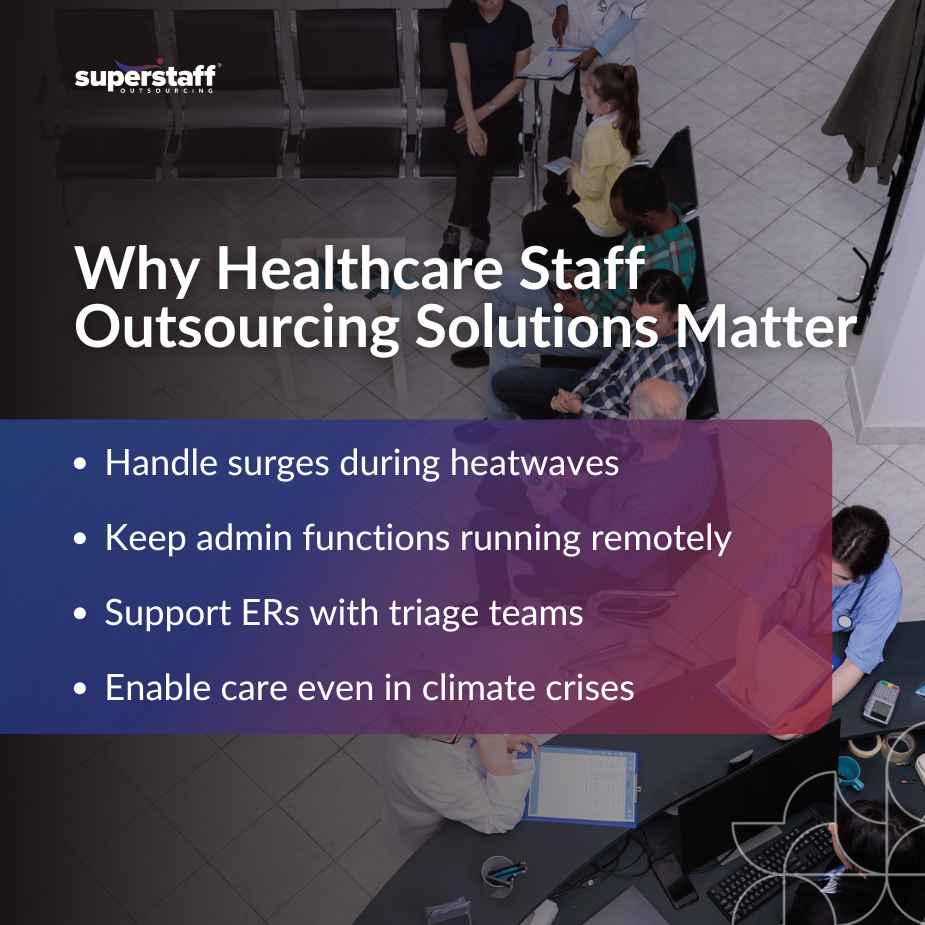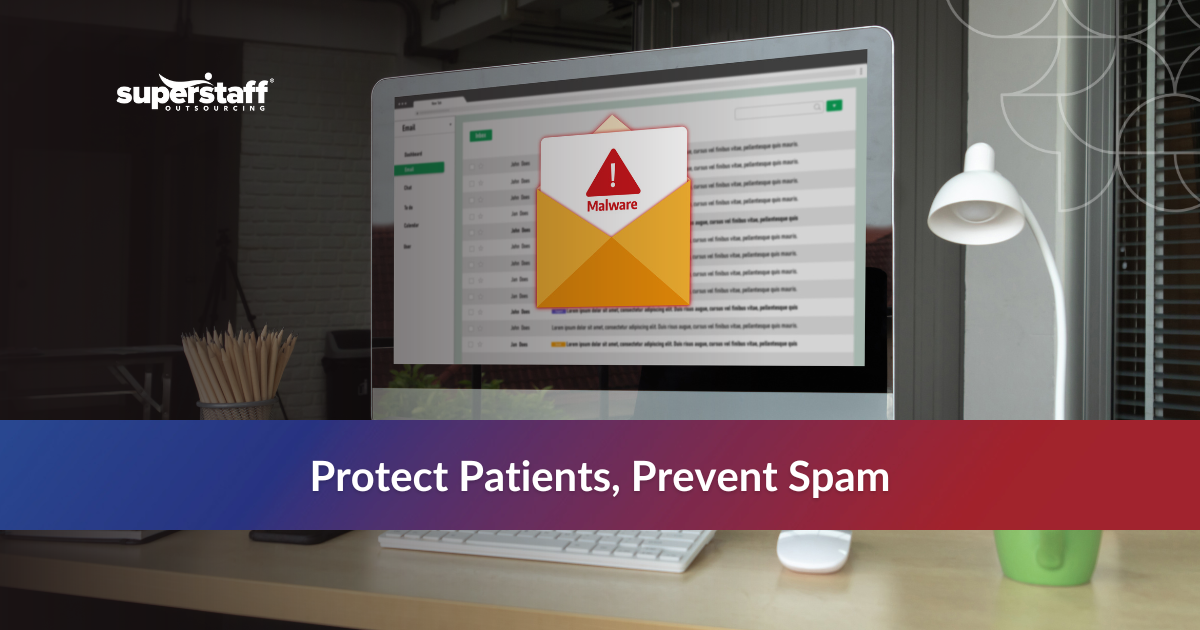
What happens to a healthcare system when a heatwave sends ER visits soaring overnight? The answer isn’t just increased wait times or strained doctors—it’s operational chaos. Climate change is no longer a distant concern.
It’s an immediate disruptor, overwhelming hospitals with heatstroke cases, respiratory illnesses, and logistical breakdowns. As patient loads grow and staffing thins out, healthcare leaders are scrambling to find support systems that can keep care running. This is where healthcare staff outsourcing solutions become more than cost-saving tactics—they become a lifeline.
Let’s take a deeper look at how outsourcing enables hospitals and clinics to maintain resilience, preserve continuity, and care for more patients when it matters most.
Climate Chaos Is Breaking the Healthcare System’s Limits

Over the past few summers, we’ve seen climate events that feel more like scenes from a disaster film. Blistering heatwaves, choking wildfire smoke, and record-setting floods don’t just affect infrastructure. They affect people’s lungs, hearts, and hydration levels. Emergency rooms fill up with patients suffering from heatstroke, asthma attacks, and chronic illness flare-ups. And this surge doesn’t wait for hospital staffing to catch up.
Often, these extreme weather events coincide with peak vacation periods or long-standing staff burnout. Hospitals are short on hands just when they need more of them. And when natural disasters knock out power or destroy roads, even reaching the hospital becomes a challenge for both patients and staff. In these moments, traditional staffing models break down fast. If a hospital doesn’t have a backup plan, patient care suffers. That’s why healthcare staff outsourcing solutions are now becoming essential, not optional.
Outsourcing Brings Agility When It’s Needed Most
Outsourcing is often seen as a way to cut costs, but in emergencies, it’s about moving fast. Offshore teams can take on non-clinical but mission-critical tasks—like insurance verification, appointment rescheduling, or handling triage calls—so that the on-site staff can focus on urgent care. These teams can be scaled up quickly, allowing healthcare systems to respond to a patient surge within hours instead of days.
Consider a coastal hospital preparing for a Category 4 hurricane. Evacuation plans are in motion, local call lines are swamped, and clerical teams are nowhere near caught up. Offshore agents, already trained in the hospital’s workflows, can jump in remotely to handle calls, guide patients, and document critical updates in real time. Because they’re unaffected by the local disaster, they offer something that on-site staff simply can’t during those moments—stability.
What makes healthcare staff outsourcing solutions powerful is their ability to deliver support from a distance, and at scale. While patients call in from mobile devices or wait in emergency shelters, someone is still on the other end, answering, assisting, and documenting. It’s not just a workaround. It’s a strategic advantage.
Keeping Care Moving No Matter the Forecast
When disaster strikes, patient care is often disrupted not because of a lack of clinical skill but because the system around it falters. Documentation piles up. Billing is delayed. EMRs go untouched. Yet hospitals need those systems functioning to stay operational. Offshore healthcare teams can step in and carry those loads—updating charts, managing claims, and processing patient records in real time.
In these situations, outsourcing doesn’t just provide manpower. It brings continuity. Healthcare staff outsourcing solutions ensure that while nurses and doctors are treating patients on the ground, someone else is keeping the administrative heartbeat going in the background. That means the billing department doesn’t fall behind, reimbursements aren’t delayed, and patient histories stay up to date. In moments where every second matters, that kind of reliability keeps a hospital’s operations from stalling out.
And this isn’t a guessing game. These teams are trained in U.S. healthcare protocols, including HIPAA compliance. They know how to navigate patient privacy, manage workflows, and collaborate seamlessly with internal teams. That kind of readiness makes a difference when you’re facing a climate emergency.
Decentralized Care Starts With Remote Triage and Contact Centers
During COVID-19, the world learned just how fragile in-person care delivery really is. And when summer heatwaves roll in or air quality tanks during wildfire season, those same vulnerabilities resurface. This is where remote triage comes in. By outsourcing triage to trained agents who can handle inquiries via voice, chat, or SMS, healthcare providers can reduce the number of unnecessary walk-ins and redirect patients to the right care paths.
Patients calling in with mild symptoms—nausea, dizziness, fatigue—might not need an ER visit. But without someone to guide them, they show up anyway. Remote agents trained in triage protocols can de-escalate these situations, suggest virtual appointments, or offer first-line advice. That eases the burden on ERs, keeps non-critical patients safer at home, and helps prevent avoidable readmissions.
This kind of setup requires infrastructure, training, and continuity. And once again, healthcare staff outsourcing solutions are a key part of delivering that level of responsiveness at scale. Offshore call centers equipped with multilingual agents can serve diverse patient populations without pause, making care more accessible even in the most unpredictable moments.
Planning Ahead, Not Just Playing Catch-Up
One of the biggest mistakes healthcare providers make is waiting for the next emergency before acting. Outsourcing allows providers to get ahead of the crisis curve. By building relationships with offshore partners ahead of time, hospitals can create pre-trained, backup staffing pools that can be activated at a moment’s notice. This turns outsourcing into a proactive tool—not just a reactive one.
Think about it as continuity planning. Cloud-based platforms allow offshore teams to integrate smoothly with existing hospital systems, accessing the same scheduling portals, EMRs, and billing systems. Year-round support can also reduce burnout among in-house teams, which means your frontline staff is better rested and more ready when patient surges happen.
And when the weather report shows incoming record highs or a major storm brewing, healthcare leaders won’t have to scramble to find coverage. With a solid outsourcing partner in place, they can switch into emergency mode without breaking continuity. That kind of resilience starts with planning, not panic.
SuperStaff Delivers Healthcare Outsourcing You Can Count On
At SuperStaff, we’ve built a model that goes beyond just plugging staffing gaps. Our healthcare staff outsourcing solutions are designed for reliability, speed, and alignment with your mission. Whether you need help with patient scheduling, billing, EMR management, remote triage, or contact center operations, our teams are trained, HIPAA-compliant, and ready to integrate into your systems.
We work with healthcare providers who can’t afford downtime—especially during extreme events. Our teams are available 24/7, ensuring that your patients are supported even when local operations are overwhelmed. And because we operate from climate-resilient locations, we can step in when disaster hits your region.
Imagine a mid-sized hospital facing a local blackout during a heatwave. Phone lines are jammed. Appointments are being canceled. Our remote teams can field calls, reschedule patients, send out SMS updates, and log key data into your systems—all while your local staff focuses on keeping patients safe.
That’s not just support. That’s a real partnership.
We’ve seen firsthand how the right outsourcing strategy can prevent chaos, preserve care quality, and ease the burden on overworked staff. It’s why so many healthcare organizations now view outsourcing not as a backup plan but as a critical part of their operational strategy.
Conclusion: Why Healthcare Staff Outsourcing Solutions Are Essential in a Climate-Disrupted World
There’s no denying it anymore. Climate emergencies are rewriting the rules of healthcare delivery. Heatwaves, wildfires, and hurricanes are stretching our systems to their limits. But when patient surges and staffing gaps collide, healthcare staff outsourcing solutions offer a powerful safety net.
Healthcare staff outsourcing solutions don’t just fill empty seats. They bring structure, scalability, and continuity to hospitals in chaos. From keeping patient records updated to offering first-line triage, offshore teams allow healthcare providers to keep delivering care—no matter what the skies are doing outside.
If your organization is ready to plan smarter, not just react faster, SuperStaff can help. Our healthcare staff outsourcing solutions are built to keep your operations running through the worst-case scenarios. Don’t wait for the next climate crisis to act. Talk to SuperStaff today about building a resilient, scalable support model that keeps you ready for whatever comes next.






